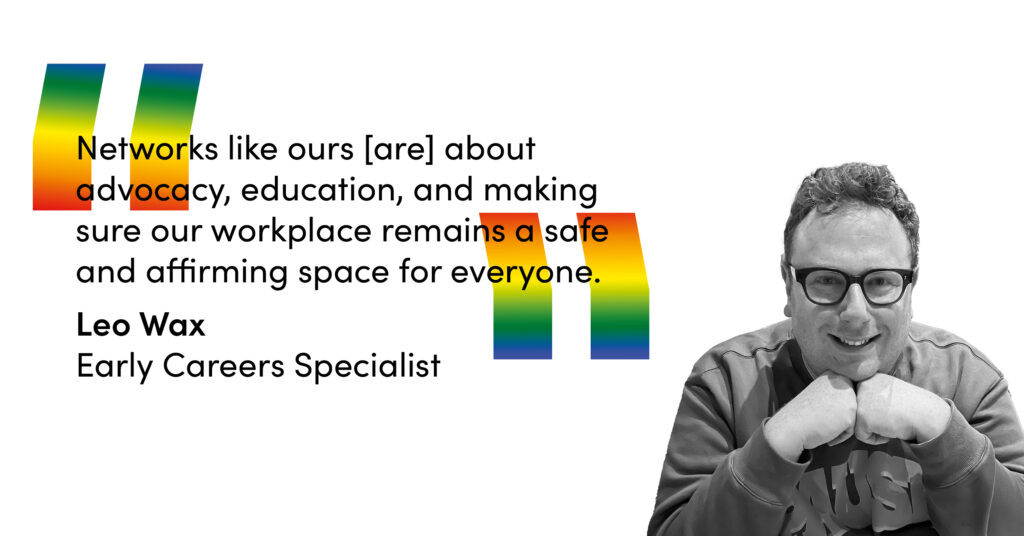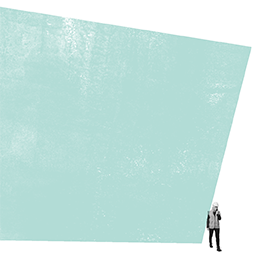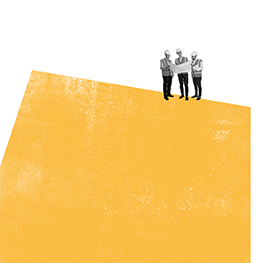As we celebrate Pride Month, we’re proud to launch our new Pride Network – an inclusive space for LGBTQIA+ colleagues and allies to connect, support one another, and drive meaningful change.
Leading this exciting new chapter is Leo Wax (he/they), our Early Careers Specialist and newly appointed Pride Network Lead. With a deep commitment to equity and inclusion, Leo brings both professional insight and personal lived experience as a gay, non-binary person to the role. In this Q+A, Leo shares why the network matters, what it hopes to achieve, and how we can all play a part in building a more inclusive workplace.

Q1: What inspired you to take on the role of Pride Network Lead?
I’ve always believed in the power of visibility and community. When the opportunity came up to help shape a space where LGBTQIA+ colleagues could feel seen, supported, and celebrated, I knew I wanted to be part of that. It’s about making sure no one feels like they have to leave part of themselves at the door when they come to work.
Q2: Why is having a Pride Network important?
It’s not just about rainbow flags in June. A Pride Network helps embed inclusion into the everyday culture of a company. It gives LGBTQIA+ staff a voice, a support system, and a platform to influence policy and practice. It also helps educate and engage allies, which is key to building a truly inclusive environment. We all have more to learn when it comes to creating authentically inclusive spaces, and so I think this network plays an important role in doing that.
Q3: What are some of the key priorities for the network this year?
We’re focusing on three main areas:
- Creating safe spaces for open conversation and peer support
- Reviewing and improving internal policies, like inclusive language and transitioning at work
- Advocating for practical changes – like inclusive bathrooms and inclusive onboarding materials
Q4: What does a “safe space” at work mean to you?
It means being able to show up as your full self without fear of judgment or exclusion. It’s about knowing that your identity will be respected, your pronouns used correctly, and that there are people around you who will stand up for you if needed.
Q5: How can colleagues be better allies to LGBTQIA+ people at work?
Start by listening. Educate yourself, ask respectful questions, and don’t assume. Use inclusive language, challenge inappropriate comments, and show up – whether that’s attending a Pride event or just adding your pronouns to your email signature. Small actions add up. Don’t underestimate the impact of doing something small, like using someone’s pronouns correctly, or using inclusive language.
Q6: What’s one thing you wish more people understood about being non-binary?
That being non-binary is a valid identity, and it looks different for everyone. For me, using he/they pronouns reflects the fluidity of how I experience gender. Respecting that is a basic form of dignity. It’s still very much something that is “in flux” for me, and I think many aspects of gender and sexuality can be fluid.
Q7: What’s your hope for the future of the Pride Network?
I’d love to see it become a vibrant, visible part of our culture, something that’s active all year round, not just in June. I want it to be a space where people feel empowered, connected, and proud.
Q8: What kinds of policies do you think are essential for supporting LGBTQIA+ colleagues in the workplace?
Inclusive policies are the foundation of a safe and respectful workplace. That means having clear guidance on things like transitioning at work, inclusive language, pronoun use, and access to gender-neutral facilities. But it also means ensuring those policies are lived – not just written. Training, accountability, and leadership support are key to making sure LGBTQIA+ colleagues feel genuinely supported.
Q9: How do you see the role of the network in light of recent developments affecting trans rights in the UK?
The recent UK Supreme Court ruling that defines “sex” in law as the sex assigned at birth is deeply concerning. It risks excluding trans people from spaces that align with their identity, even if they have legal recognition through a gender recognition certificate.
In this context, networks like ours have become even more vital. They’re not just about celebration – they’re about advocacy, education, and making sure our workplace remains a safe and affirming space for everyone, regardless of what’s happening outside our walls.







